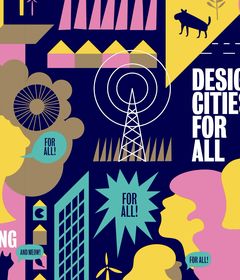In Designing Cities for All, we take a deep dive into (re)designing just cities, together with designers, scientists, experts, educational institutions, ánd six Fellows. Inequality and exclusion are also affected by how we define our digital world. Tech giants are encroaching on our streets in very tangible ways, disrupting our neighbourhoods. This particular series is curated by Techno Futurist Galit Ariel, who wants to evoke new ways to hack the city (for good). In this third and last episode, we talk about activism, creativity, and individualism in digital urban spaces. How do you become a digital urban space activist and how do you build virtual spaces for social impact?

Dr. Natalie Dixon (Amsterdam) is the founder of affect lab, a women-led creative studio and research practice, and loves exploring questions of gender, race, and belonging through the lens of technology. Natalie believes in community-based co-creation. At Affect lab, she collaborates with artists, neighbours, gender activists, urbanists, architects, designers, writers and theorists to tell stories about techno-culture.
Klasien van de Zandschulp is an Amsterdam-based interactive artist and creative director at studio affect lab. She designs story-based and participatory experiences, blending digital/physical and online/offline interactions. Her work explores sensory design, embodiment, rituals, augmented realities, human interaction and (radical) thoughts around our daily technology consumption. During the recent lockdown she created ‘DISTANCE DISCO‘, a virtual dance floor for techno romances!
Recently Klasien and Natalie won a Dutch Design award (design research category) for the project Good Neighbours. Good Neigbours is a public art project about intimate surveillance and the micro-politics of neighbourhoods. This research aims to raise urgent questions about community-making and intimate surveillance technology. They explore how communities create spaces of belonging and alienation through mobile platforms like WhatsApp and Nextdoor as well as intimate surveillance technologies such as Nest cameras, Teslacams and Ring doorbells.
Good Neighbours Live Performance from affect lab on Vimeo.
Galit Ariel is a TechnoFuturist, author, and creative who explores the wild and imaginative side of immersive technologies. She is the author of Augmenting Alice – The Future of Identity, Experience and Reality, a book that explores the way Augmented Reality’s diffusion will shift core paradigms and interactions related to culture, space, embodiment, agency, and ethics. Through her art/tech futures agency Future Memory Inc. she helps organisations and policymakers shape their technological futures and develop immersive experiences, interaction tools, and narratives. Galit is currently conducting her research-by-design Ph.D. at York University, exploring paradigms of immersive presence. In her DCFA Fellowship, Galit will explore the impact of tech-infused urban environments on agency, representation, and self-expression, evoking new ways to hack the city (for good).










